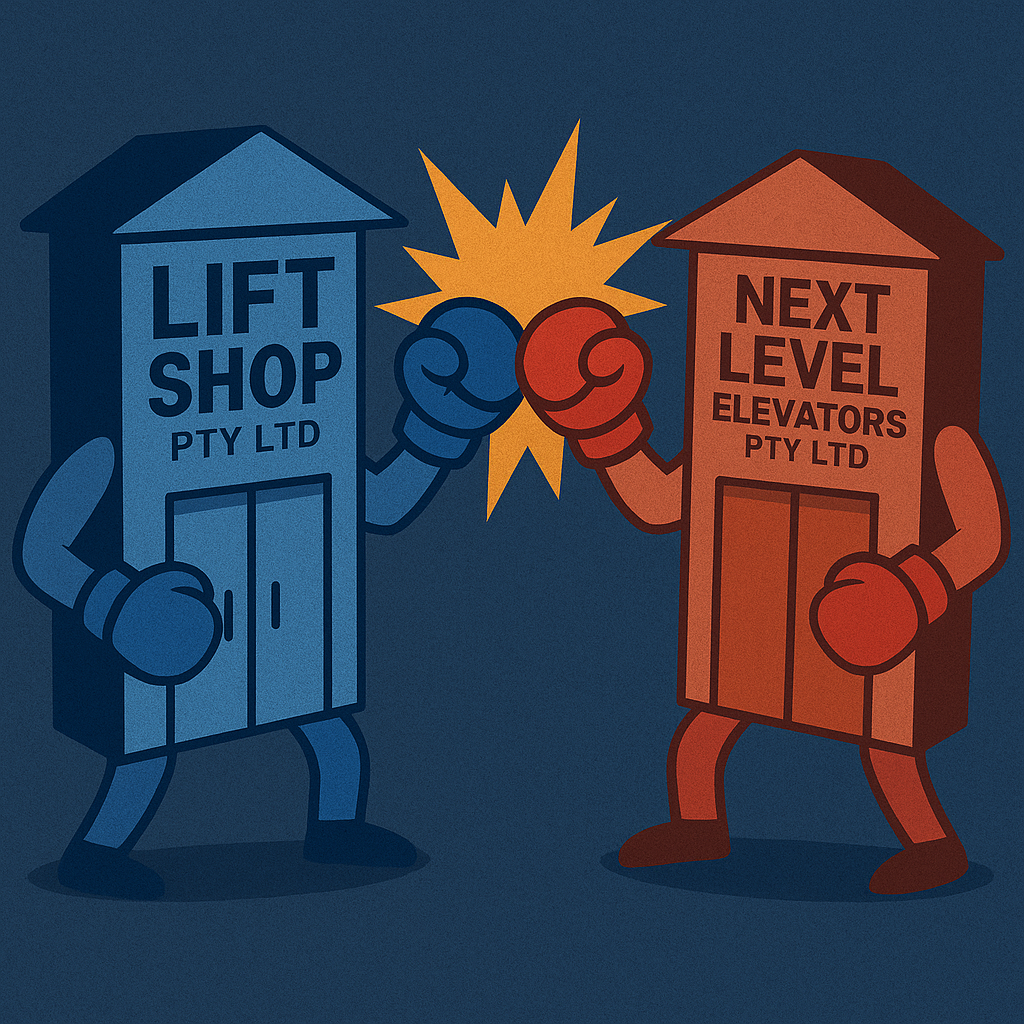When Copying Doesn’t Pay: Lift Shop v Next Level Goes All the Way Up
 What happens when copyright infringement is admitted but the “big ticket” remedies fall away?
What happens when copyright infringement is admitted but the “big ticket” remedies fall away?
The recent battle between residential lift rivals Lift Shop and Next Level Elevators shows how hard it can be to turn technical wins into commercial victories.
The Backstory
Lift Shop and Next Level are fierce competitors in the Australian residential lift market. The dispute began when a Lift Shop quotation template found its way into Next Level’s hands in late 2019. Next Level adapted the template and used it for a few months until April 2020.
Lift Shop sued in the Federal Circuit and Family Court, claiming:
-
Copyright infringement of its quotation documents,
-
Breach of confidence over information allegedly supplied by a former employee, and
-
Misleading or deceptive conduct under the ACL in relation to marketing and compliance claims.
Next Level hit back with its own ACL allegations.
The Primary Judgment (June 2024)
Judge Baird found that Next Level (and two of its directors) had indeed infringed Lift Shop’s copyright by using the quotation template. But the win was thin:
-
Additional damages refused: Although infringement was established, the Court declined to award extra damages under s 115(4) of the Copyright Act. The use was brief, not particularly lucrative, and not deemed “flagrant.”
-
Breach of confidence dismissed: Lift Shop couldn’t prove its customer quotes were truly confidential. Some of the same material had even been accessible on its website due to a coding plug-in glitch.
-
ACL claims failed on both sides: The Court wasn’t persuaded that either company had misled consumers about their lifts. Importantly, the judge observed the Court was not an industry regulator.
In short, Lift Shop walked away with a declaration of infringement, but none of the additional relief it wanted.
The Appeal (August 2025)
Unhappy with the limited result, Lift Shop appealed to the Full Court. Its main targets were:
-
Additional damages – arguing the primary judge was wrong to rule them out before quantum was assessed.
-
Flagrancy – insisting Next Level’s copying was sufficiently egregious to attract extra damages.
-
Confidential information – contending the judge erred in finding no breach of confidence and in admitting documents obtained from its website by Next Level’s solicitors.
The Full Court (Feutrill, Neskovcin and Moore JJ) dismissed the appeal:
-
Additional damages can be decided early: The Court confirmed that entitlement to additional damages can be determined at the liability stage, even before election or quantum. Entitlement and quantification are distinct steps. This follows the approach in Redbubble v Hells Angels and Motorola v Hytera.
-
Flagrancy is a matter of degree: The assessment under s 115(4) isn’t binary (“flagrant or not”). It involves weighing the degree of flagrancy along with other factors. The primary judge’s evaluative judgment disclosed no error under House v The King.
-
No confidentiality: A Lift Shop customer quote was not confidential, particularly when similar documents were accessible online. The Court also held that Next Level’s solicitors had not acted improperly in locating documents via the website.
Result: appeal dismissed with costs.
Key Takeaways
-
Copyright is not a lottery ticket. Even where infringement is admitted, additional damages are far from automatic. Courts look for truly egregious, flagrant conduct.
-
Two steps to additional damages. Entitlement and quantification are separate. Entitlement can be determined at the liability stage – and losing that fight early can dramatically weaken a case.
-
Confidentiality must be managed. If “confidential” material can be accessed on a public website, or is too widely circulated, courts are reluctant to protect it.
-
ACL claims cut both ways. Rival traders often throw ACL allegations at each other, but without strong evidence, the Court may simply dismiss both.
Why It Matters
For litigants, this case is a reminder that winning the infringement battle doesn’t always mean winning the war on remedies. Strategic choices about pleading confidentiality, securing websites, and framing additional damages arguments can decide whether a lawsuit delivers real value—or just a hollow declaration.